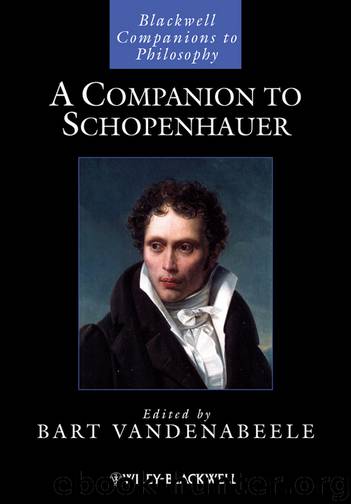A Companion to Schopenhauer by Vandenabeele Bart;

Author:Vandenabeele, Bart;
Language: eng
Format: epub
Publisher: Wiley
Published: 2011-11-23T16:00:00+00:00
14
Schopenhauer on Tragedy and the Sublime
ALEX NEILL
At its best, Schopenhauer suggests, tragic drama:
shows us the greatest misfortune not as an exception, not as something brought about by rare circumstances or by monstrous characters, but as something that arises easily and spontaneously out of the actions and characters of men, as something almost essential to them, and in this way it is brought terribly near to us. … [It] shows us those powers that destroy happiness and life, and in such a way that the path to them is at any moment open even to us. We see the greatest suffering brought about by entanglements whose essence could be assumed even by our own fate, and by actions that perhaps even we might be capable of committing … Then, shuddering, we feel ourselves already in the midst of hell.
(WWR I, 254–55; emphasis mine)
On the one hand, of course, this passage appears to invoke one or another version of the so-called “paradox of tragedy”: if this is what the experience of tragedy is like, how can we take pleasure in that experience or in the kind of work which provides it? But the passage also prompts a more fundamental question concerning the coherence of Schopenhauer’s aesthetic theory. For as he describes it here, the experience of (at least some varieties of) tragedy appears to be of a kind in which the spectators understand what is depicted in the work in relation to their own lives – in relation to what, in Aristotle’s terms, “would be likely to happen,” “could happen” or “ought to have happened” (Poetics 51b, 27–32) to them, as individuals – and as a result they respond to it viscerally, with emotion. This is puzzling, for as Schopenhauer has characterized it earlier, aesthetic experience depends on “abolishing individuality in the knowing subject” (WWR I, 169); it is a variety of experience in which “we lose ourselves entirely” in the object of the experience: “in other words, we forget our individuality, our will, and continue to exist only as pure subject” (WWR I, 178). The pleasure of aesthetic contemplation has its source precisely in “the self-consciousness of the knower … as pure, will-less subject of knowledge” (WWR I, 195–96): once we have “given ourselves up to pure, will-less knowing, we have stepped into another world, so to speak, where everything that moves our will, and thus violently agitates us, no longer exists” (WWR I, 197). In short, Schopenhauer emphasizes time and time again that the hallmark of aesthetic experience is its “will-lessness”; this is his distinctive take on the familiar thought that aesthetic experience is defined in terms of its “disinterestedness.” As he characterizes the experience of tragedy, however, it is a kind of experience in which the individual will appears to be very much involved, a kind of experience that appears to be positively will-full. How then can the experience of tragedy constitute genuinely aesthetic experience?
This tension in Schopenhauer’s aesthetic theory is not generated solely by his characterization of our
Download
This site does not store any files on its server. We only index and link to content provided by other sites. Please contact the content providers to delete copyright contents if any and email us, we'll remove relevant links or contents immediately.
The remains of the day by Kazuo Ishiguro(8968)
Tools of Titans by Timothy Ferriss(8363)
Giovanni's Room by James Baldwin(7319)
The Black Swan by Nassim Nicholas Taleb(7104)
Inner Engineering: A Yogi's Guide to Joy by Sadhguru(6785)
The Way of Zen by Alan W. Watts(6594)
Asking the Right Questions: A Guide to Critical Thinking by M. Neil Browne & Stuart M. Keeley(5752)
The Power of Now: A Guide to Spiritual Enlightenment by Eckhart Tolle(5744)
The Six Wives Of Henry VIII (WOMEN IN HISTORY) by Fraser Antonia(5495)
Astrophysics for People in a Hurry by Neil DeGrasse Tyson(5174)
Housekeeping by Marilynne Robinson(4434)
12 Rules for Life by Jordan B. Peterson(4299)
Double Down (Diary of a Wimpy Kid Book 11) by Jeff Kinney(4257)
The Ethical Slut by Janet W. Hardy(4241)
Ikigai by Héctor García & Francesc Miralles(4237)
Skin in the Game by Nassim Nicholas Taleb(4235)
The Art of Happiness by The Dalai Lama(4120)
Skin in the Game: Hidden Asymmetries in Daily Life by Nassim Nicholas Taleb(3987)
Walking by Henry David Thoreau(3950)
